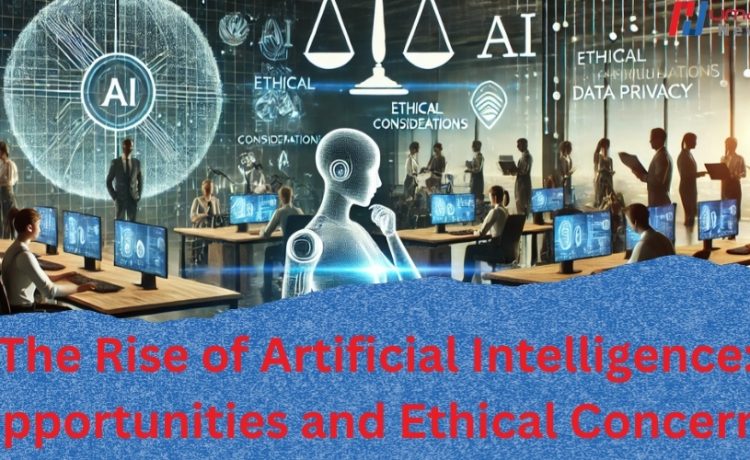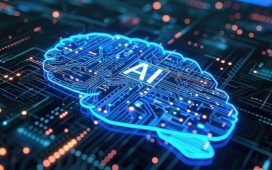Artificial Intelligence (AI) has rapidly evolved over the past decade, transforming various sectors and reshaping the way we live and work. From enhancing customer service through chatbots to automating complex data analyses, AI offers significant opportunities for innovation and efficiency.
However, as its capabilities expand, so do the ethical concerns surrounding its use. This article explores the opportunities presented by the rise of Artificial Intelligence and the ethical dilemmas that arise alongside its growth.
Opportunities Presented by AI

- Increased Efficiency and Productivity: AI has the potential to automate repetitive tasks, allowing human workers to focus on more complex and creative activities. For example, in manufacturing, AI-powered robots can perform assembly line tasks with precision and speed, resulting in increased productivity and reduced operational costs. This efficiency extends to various industries, including finance, healthcare, and logistics.
- Enhanced Decision-Making: AI systems can analyze vast amounts of data much faster than humans, providing insights that can inform decision-making processes. In healthcare, AI algorithms can assist in diagnosing diseases by analyzing medical images, identifying patterns that might go unnoticed by human professionals. This capability not only improves diagnostic accuracy but also enables timely interventions, potentially saving lives.
- Personalization: It allows businesses to give personalized experiences to their customers. E-commerce platforms use AI algorithms to analyze consumer behavior and preferences, providing tailored recommendations that enhance user experience and drive sales. It will enhance customer satisfaction and loyalty.
- Innovations in Various Fields: AI is driving innovations in numerous sectors, including transportation, agriculture, and education. Autonomous vehicles are revolutionizing transportation, while AI-driven tools in agriculture optimize crop yields through predictive analytics. In education, AI can create adaptive learning environments that cater to individual student needs, enhancing the learning experience.
Ethical Concerns Surrounding AI
The rise of Artificial Intelligence opportunities presented are significant, they come with ethical concerns that must be addressed:
- Bias and Discrimination: AI systems are trained on historical data, which may contain biases. If these biases are not addressed, AI can perpetuate and even exacerbate discrimination in decision-making processes. For instance, algorithms used in hiring or lending may unfairly disadvantage certain demographic groups, leading to systemic inequalities.
- Privacy Issues: The widespread use of AI often involves the collection and analysis of personal data. This raises concerns about privacy and data security. Individuals may not be fully aware of how their data is being used, leading to potential misuse and a loss of trust in organizations. Striking a balance between leveraging data for AI advancements and protecting individual privacy is a critical challenge.
- Job Opportunities: AI poses a risk to jobs that are repetitive or routine. Workers in industries affected by automation may find it challenging to transition to new roles, raising concerns about economic inequality and the need for retraining programs.
- Accountability and Transparency: As AI systems make decisions, questions arise regarding accountability. If an AI system makes a mistake or causes harm, it can be challenging to determine who is responsible—the developer, the organization using the AI, or the AI itself? Additionally, many AI algorithms operate as “black boxes,” making it difficult to understand how they arrive at certain decisions.
Navigating the Future of AI

To fully harness the potential of AI while addressing its ethical concerns, a multi-faceted approach is essential:
- Regulatory Frameworks: Governments and regulatory bodies must establish clear guidelines and standards for AI development and use. This includes addressing issues of bias, privacy, and accountability, ensuring that ethical considerations are integrated into AI systems from the ground up.
- Public Awareness and Engagement: Raising awareness about AI and its implications is crucial for fostering informed public discourse. Engaging diverse stakeholders, including ethicists, technologists, and community representatives, can help shape the ethical landscape of AI.
- Ethical AI Development: Developers and organizations must prioritize ethical considerations throughout the AI lifecycle. This includes conducting bias audits, ensuring data privacy, and implementing transparent practices in AI decision-making processes.
The rise of artificial intelligence presents remarkable opportunities for innovation and efficiency across various sectors. However, it is essential to navigate the accompanying ethical concerns thoughtfully.







